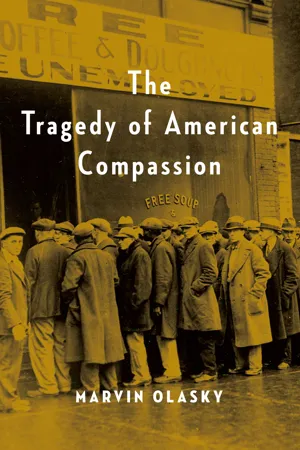
- 300 pages
- English
- ePUB (mobile friendly)
- Available on iOS & Android
The Tragedy of American Compassion
About this book
Can a man be content with a piece of bread and some change tossed his way from a passerby? Today's modern welfare state expects he can. Those who control the money in our society think that giving a dollar at the train station and then appropriating a billion dollars for federal housing can cure the ails of the homeless and the poor. But the crisis of the modern welfare state is more than a crisis of government. Private charities that dispense aid indiscriminately while ignoring the moral and spiritual needs of the poor are also to blame. Like animals in the zoo at feeding time, the needy are given a plate of food but rarely receive the love and time that only a person can give. Poverty fighters 100 years ago were more compassionate--in the literal meaning of "suffering with"--than many of us are now. They opened their own homes to deserted women and children. They offered employment to nomadic men who had abandoned hope and human contact. Most significantly, they made moral demands on recipients of aid. They saw family, work, freedom, and faith as central to our being, not as life-style options. No one was allowed to eat and run. Some kind of honest labor was required of those who needed food or a place to sleep in return. Woodyards next to homeless shelters were as common in the 1890s as liquor stores are in the 1990s. When an able bodied woman sought relief, she was given a seat in the "sewing room" and asked to work on garments given to the helpless poor. To begin where poverty fighters a century ago began, Marvin Olasky emphasizes seven ideas that recent welfare practice has put aside: affiliation, bonding, categorization, discernment, employment, freedom, and most importantly, belief in God. In the end, not much will be accomplished without a spiritual revival that transforms the everyday advice we give and receive, and the way we lead our lives. It's time we realized that there is only so much that public policy can do. That only a richness of spirit can battle a poverty of soul. The century-old question--does any given scheme of help... make great demands on men to give themselves to their brethren?--is still the right one to ask. Most of our 20th-century schemes have failed. It's time to learn from the warm hearts and hard heads of the 19th-century.
Frequently asked questions
- Essential is ideal for learners and professionals who enjoy exploring a wide range of subjects. Access the Essential Library with 800,000+ trusted titles and best-sellers across business, personal growth, and the humanities. Includes unlimited reading time and Standard Read Aloud voice.
- Complete: Perfect for advanced learners and researchers needing full, unrestricted access. Unlock 1.4M+ books across hundreds of subjects, including academic and specialized titles. The Complete Plan also includes advanced features like Premium Read Aloud and Research Assistant.
Please note we cannot support devices running on iOS 13 and Android 7 or earlier. Learn more about using the app.
Information
Table of contents
- Cover
- Title Page
- Dedication
- Acknowledgments
- Preface to the Thirtieth Anniversary Edition
- Preface
- Introduction: The Current Impasse
- Chapter One: The Early American Model of Compassion
- Chapter Two: Turning Cities into Countryside
- Chapter Three: First Challenge to the Charity Consensus
- Chapter Four: The Social Darwinist Threat
- Chapter Five: Proving Social Darwinism Wrong
- Chapter Six: The Seven Marks of Compassion
- Chapter Seven: And Why Not Do More?
- Chapter Eight: Excitement of a New Century
- Chapter Nine: Selling New Deals in Old Wineskins
- Chapter Ten: Revolution—and Its Heartbreak
- Chapter Eleven: Questions of the 1970s and 1980s
- Chapter Twelve: Putting Compassion into Practice
- Chapter Thirteen: Applying History
- Notes
- Index
- Copyright